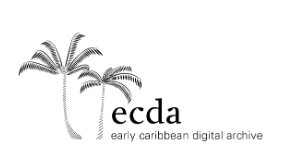Early Caribbean Digital Archive (EDCA)
Created by Professor Nicole Aljoe and Professor Elizabeth Maddock Dillon at Northeastern University the Early Caribbean Digital Archive (ECDA) is an open access collection of pre-twentieth century texts, maps, images, travel narratives, poetry and diaries from the Caribbean, never made cohesive. This collection ‘tells the story of European imperial domination, and of the enslaved African and Indigenous American people whose lives, labour, and land shaped the culture and development of the Atlantic world’. Their aim is to use digital tools to centre the creativity of enslaved and free African, Afro-creole, and Indigenous peoples from the Caribbean. The project consists of three main sections: Archive, Classroom, and Exhibits, including methods by which educators can utilise to integrate the ECDA into the classroom, and has been described as an ‘essential educational resource’.
Furthermore, they show how literary criticism (specifically: postcolonial analysis) can be expanded through digital methods. One method by which this is achieved is their use of shared disciplines. The ECDA exemplify a combination of departments common across the field – since the archive contains literary studies, digital archiving, postcolonial theory, and technical development, with the purpose of challenging colonial documentations. They have explored collaboration between digital humanities and digital advancement, illustrating how interdisciplinary collaboration can be used to both recover and display suppressed narratives. The archive was constructed from fragmented pieces of historical texts. These were then contextualised with postcolonial technique – a methodology which uncovered and intervened in the disruptions within the digital record produced, as is the intention of Digital Humanities studies.
Writer David Berry situates Postcolonial ‘critical digital humanities’ under the environment of politically engaged practices – creating avenues for new forms of presentation and publication. ECDA is a powerful example of postcolonial digitisation, offering a framework for reconstructing Caribbean histories. This demonstrates that constructing in Digital Humanities is not simply digitising and saving context but finding entirely new knowledge. For example, in their act of digitising Caribbean texts, ECDA uncovered slave accounts hidden in colonial documentation – changing the narrative that they did not exist in this part of the world. Therefore, the construction of the site rewrote our understanding of the Caribbeans historical context, spreading necessary awareness and unveiling truths that otherwise may have been lost.




This demonstrates that constructing in Digital Humanities is not simply digitising and saving context but finding entirely new knowledge. For example, in their act of digitising Caribbean texts, ECDA uncovered slave accounts hidden in colonial documentation – changing the narrative that they did not exist in this part of the world. Therefore, the construction of the site rewrote our understanding of the Caribbeans historical context, spreading necessary awareness and unveiling truths that otherwise may have been lost.
A byproduct of this is amplifying marginalised voices, as society ‘must ensure that he stories and voices which have been underrepresented’ in archives produced by ‘formerly colonised countries, from Indigenous communities, and from those who are marginalised in their national contexts’ – can be shared. The ECDA achieves this, through their prioritisation of those previously silenced by digital knowledge traditions.
However, this is not just about knowledge sharing: it is about survival. Cultural survival. By putting social justice at its centre and widening access to cultural productions means we can ‘reshape the dynamics of cultural power’ as an act of reclamation against oppression. By supporting communities across the Caribbean diaspora by validating history and resisting the erasure of colonialism.
